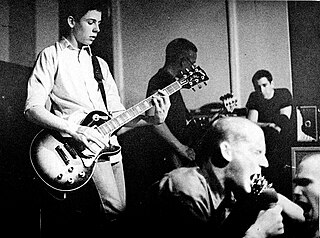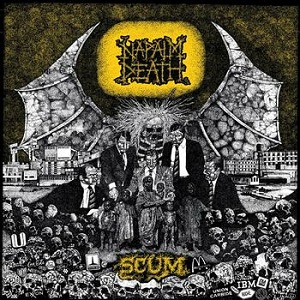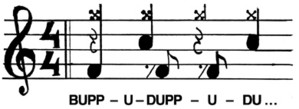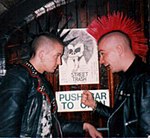Grindcore is an extreme fusion genre of heavy metal and hardcore punk that originated in the mid-1980s, drawing inspiration from abrasive-sounding musical styles, such as thrashcore, crust punk, hardcore punk, extreme metal, and industrial. Grindcore is considered a more noise-filled style of hardcore punk while using hardcore's trademark characteristics such as heavily distorted, down-tuned guitars, grinding overdriven bass, high-speed tempo, blast beats, and vocals which consist of growls, shouts and high-pitched shrieks. Early groups such as England's Napalm Death are credited with laying the groundwork for the style. It is most prevalent today in North America and Europe, with popular contributors such as Brutal Truth and Nasum. Lyrical themes range from a primary focus on social and political concerns, to gory subject matter and black humor.
Punk rock is a rock music genre that emerged in the mid-1970s. Rooted in 1950s rock and roll and 1960s garage rock, punk bands rejected the corporate nature of mainstream 1970s rock music. They typically produced short, fast-paced songs with hard-edged melodies and singing styles with stripped-down instrumentation. Lyricism in punk typically revolves around anti-establishment and anti-authoritarian themes. Punk embraces a DIY ethic; many bands self-produce recordings and distribute them through independent labels.

Hardcore punk is a punk rock subgenre and subculture that originated in the late 1970s. It is generally faster, harder, and more aggressive than other forms of punk rock. Its roots can be traced to earlier punk scenes in San Francisco and Southern California which arose as a reaction against the still predominant hippie cultural climate of the time. It was also inspired by Washington, D.C., and New York punk rock and early proto-punk. Hardcore punk generally eschews commercialism, the established music industry and "anything similar to the characteristics of mainstream rock" and often addresses social and political topics with "confrontational, politically charged lyrics".
Anarcho-punk is an ideological subgenre of punk rock that promotes anarchism. Some use the term broadly to refer to any punk music with anarchist lyrical content, which may figure in crust punk, hardcore punk, folk punk, and other styles.

The Exploited are a Scottish punk rock band from Edinburgh, formed in 1978 by Stevie Ross and Terry Buchan, with Buchan soon replaced by his brother Wattie Buchan. They signed to Secret Records in March 1981, and their debut EP, Army Life, and debut album, Punks Not Dead, were both released that year. The band maintained a large cult following in the 1980s among a hardcore working class punk and skinhead audience. Originally a street punk band, the Exploited eventually evolved into a crossover thrash band with the release of their album Death Before Dishonour in 1987.

Scum is the debut studio album by English grindcore band Napalm Death, released on 1 July 1987 by Earache Records. The two sides of Scum were recorded by two different lineups in sessions separated by about a year; the only musician in both incarnations was drummer Mick Harris.

Crust punk is a fusion genre of anarcho-punk and extreme metal that originated in the early to mid–1980s in England. Originally, the genre was primarily mid-tempo, making use of metal riffs in a stripped-down anarcho-punk context, however many later bands pushed the genre to be more grandiose, faster or more melodic. Often songs are political, discussing environmentalism, anarchism, anti-capitalism, feminism and animal rights.

The Varukers are a British punk rock band formed in 1979 by vocalist Anthony "Rat" Martin. They produced their most influential recordings in the early 1980s. The band play in D-beat, the musical style of Discharge. Also like Discharge, the Varukers' lyrics carry an anarchist political ideology.

GBH are an English punk rock band which was formed in 1978 by vocalist Colin Abrahall, guitarist Colin "Jock" Blyth, bassist Sean McCarthy and drummer Andy "Wilf" Williams.

British rock describes a wide variety of forms of music made in the United Kingdom. Since around 1964, with the "British Invasion" of the United States spearheaded by the Beatles, British rock music has had a considerable impact on the development of American music and rock music across the world.

Discharge are an English hardcore punk band formed in 1977 in Stoke-on-Trent, Staffordshire. The band is known for influencing several sub-genres of extreme music and their songs have been covered by some of the biggest names in heavy metal and other genres. The musical sub-genre of D-beat is named after Discharge and the band's distinctive drumbeat.

D-beat is a style of hardcore punk, developed in the early 1980s by imitators of Discharge, after whom the genre is named, as well as a drum beat characteristic of this subgenre. D-beat is known for its "grinding, distorted and brutally political" sound. Discharge may have themselves inherited the beat from Motörhead and the Buzzcocks. D-beat is closely associated with crust punk, which is a heavier, more complex variation. The style was particularly popular in Sweden, and developed there by groups such as Crude SS, Anti Cimex, Mob 47, and Driller Killer. Other D-beat groups include Doom and the Varukers from the UK; Disclose from Japan; Crucifix and Final Conflict from the U.S.; Ratos de Porão from Brazil; and MG15 from Spain. While the style initially developed in the early 1980s, a number of new groups working within the subgenre emerged in the mid-1990s. These include the Swedish groups Wolfbrigade, Totalitär, Avskum, Skitsystem, and Disfear.

The Analogs are a Polish street punk band. Originating in Szczecin, they have been successful on the local and international punk rock scene with hundreds of concerts played across Europe as well as musical releases in Poland, Russia, and the USA. The Analogs have seen coverage in major Polish news outlets as well as many alternative music publications and punk zines.

Hear Nothing See Nothing Say Nothing is the debut studio album by English hardcore punk band Discharge, released on 21 May 1982 by Clay Records.
A number of overlapping punk rock subgenres have developed since the emergence of punk rock in the mid-1970s. Even though punk genres at times are difficult to segregate, they usually show differing characteristics in overall structures, instrumental and vocal styles, and tempo. However, sometimes a particular trait is common in several genres, and thus punk genres are normally grouped by a combination of traits.
Heresy were a hardcore punk band from Nottingham, England, formed in 1985 and active until late 1989. They released three albums and recorded three sessions for John Peel's BBC Radio 1 show.
Major Accident is a punk band from the North East of England.
Animal rights are closely associated with two ideologies of the punk subculture: anarcho-punk and straight edge. This association dates back to the 1980s and has been expressed in areas that include song lyrics, benefit concerts for animal rights organisations, and militant actions of activists influenced by punk music. Among the latter, Rod Coronado, Peter Daniel Young and members of SHAC are notable. This issue spread into various punk rock and hardcore subgenres, e.g. crust punk, metalcore and grindcore, eventually becoming a distinctive feature of punk culture.

Hardcore punk in the United Kingdom began in the late 1970s and early 1980s with the second wave of punk rock in the country. The scene produced many successful and influential hardcore punk bands throughout the 1980s such as Discharge, GBH and the Exploited and led to the pioneering of genres such as grindcore, street punk, crust punk and D-beat.













